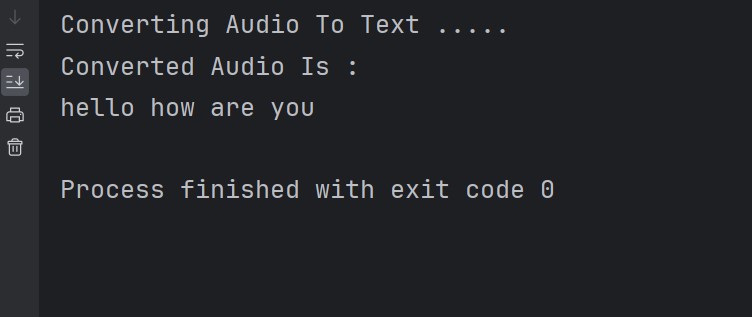In this Python article i want to show you How to Convert Recorded Audio to Text in Python, in the first and second part we have learned that how you can Convert Audio to Text using Microphone with Google Speech Recognition, you can check the articles in the below links.
Read More on Python Speech Recognition
1: Python Speech Recognition With Google Speech
2: Python Speech Recognition Open Website By Speech
So as i have mentioned in the first article we have used Google Speech Recognition, also Speech Recognition is a library for performing speech recognition, with support for several engines and APIs, online and offline. in this article also we are using Google Speech Recognition API, for installation process you can check the first article.
Speech recognition engine/API support
- CMU Sphinx (works offline)
- Google Speech Recognition
- Google Cloud Speech API
- Wit.ai
- Microsoft Bing Voice Recognition
- Houndify API
- IBM Speech to Text
- Snowboy Hotword Detection (works offline)
So now this is the complete code for Python How To Convert Recorded Audio To Text
|
1 2 3 4 5 6 7 8 9 10 11 12 13 14 15 16 17 18 19 20 21 22 23 24 25 26 27 28 29 30 31 32 33 34 35 |
# Import the speech_recognition library as sr import speech_recognition as sr # Define the main function def main(): # Path to the audio file sound = "recorded.wav" # Create a Recognizer instance r = sr.Recognizer() # Use the AudioFile context manager to open the audio file with sr.AudioFile(sound) as source: # Adjust for ambient noise r.adjust_for_ambient_noise(source) # Print a message indicating that audio conversion is in progress print("Converting Audio To Text ..... ") # Listen for audio input from the source audio = r.listen(source) # Recognize speech using Google Speech Recognition try: # Print the recognized speech print("Converted Audio Is : \n" + r.recognize_google(audio)) # Handle any exceptions that occur during speech recognition except Exception as e: # Print an error message print("Error {} : ".format(e) ) # Call the main function if the script is executed directly if __name__ == "__main__": main() |
This Python code uses the speech_recognition library to convert an audio file (recorded.wav) into text using Google Speech Recognition. It loads the audio file, adjusts for ambient noise, listens for audio input, and then attempts to transcribe the speech using Google’s service. If successful, it prints the recognized text, otherwise it prints an error message.
So now run the complete code and this will be the output.

FAQs:
Q: How to convert audio to text Python?
A: You can convert audio to text in Python using speech_recognition library. This library provides a simple interface to different speech recognition engines and APIs, and you can use it to transcribe spoken language into text. You can use the recognize_google() function to perform speech recognition using Google’s service.
Q: How do I turn an audio recording into text?
A: To turn an audio recording into text in Python, you can use speech_recognition library along with the AudioFile context manager. Load the audio file using AudioFile, adjust for ambient noise if necessary, and after that listen for audio input. Finally, use the recognize_google() function to transcribe the speech into text.
Q: How do I convert large audio files to text in Python?
A: Converting large audio files to text in Python can be done using the same approach as converting small audio files. However, processing large audio files may require more memory and processing power. It’s recommended to break large audio files into smaller segments and process them separately to avoid memory issues. You can then concatenate the text transcriptions from each segment to obtain the complete transcription of the audio file.
Q: Which of the following libraries can help us to convert audio into lyrics Python?
A: The speech_recognition library is commonly used to convert audio into text in Python. While it can transcribe spoken language into text, it does not specifically convert audio into lyrics. However, you can use the transcribed text to generate lyrics from the audio content. There are other specialized libraries and services available for generating lyrics from audio, but they may require more advanced natural language processing techniques.
Q: How to transcribe Audio to text using Python for Free?
A: To transcribe audio to text using Python for free, you can use the speech_recognition library, which provides access to different speech recognition engines and APIs.
Subscribe and Get Free Video Courses & Articles in your Email